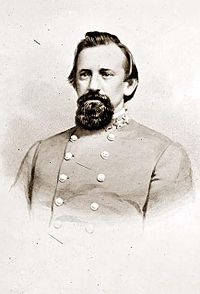Alfred Jefferson Vaughan, Jr.
| Alfred J. Vaughan, Jr. | |
|---|---|

Alfred J. Vaughan, Jr.
|
|
| Born |
May 10, 1830 Dinwiddie County, Virginia |
| Died | October 1, 1899 (aged 69) Indianapolis, Indiana |
| Place of burial | Elmwood Cemetery Memphis, Tennessee |
| Allegiance | |
| Service/branch |
|
| Years of service | 1861–65 |
| Rank |
|
| Battles/wars | American Civil War |
Alfred Jefferson Vaughan, Jr. (May 10, 1830 – October 1, 1899) was an American civil engineer, planter, soldier, and writer. He served as a Confederate general during the American Civil War, in which he was wounded twice, and fought mainly in the Western Theater of the conflict.
After the war Vaughan resumed farming, was active in Confederate veteran affairs, and was a published author. He also was part of the early formation of the Grange Movement in the United States.
Alfred J. Vaughan, Jr. was born in 1830 in Dinwiddie County, Virginia, a son of Alfred Jefferson Vaughan and his wife Dorothy. He entered the Virginia Military Institute (VMI) on July 17, 1848, and graduated 15th in a class of 29 cadets on July 4, 1851. Throughout his final year he served as "a cadet captain and company commander". While attending VMI, Vaughan was a classmate of William Y.C. Humes, who stood 2nd in the class and would also serve as a Confederate general in the Civil War.
Vaughan took up civil engineering as his chosen profession, and initially moved to Saint Joseph, Missouri, working as a surveyor for the Hannibal and St. Joseph Railroad. Soon afterward he relocated to Southern California, where he served as deputy U.S. surveyor. He then briefly was on the staff of an official for the Northern Pacific Railroad. In this work Vaughan served as the private secretary of Alfred Cumming (uncle of Confederate general Alfred Cumming) who represented the railway in peace treaty talks with the Indians living on the upper portion of the Missouri River.
...
Wikipedia
